Inclusive India: specially-abled sportspersons make a mark globally
On World Athletics Day, YourStory celebrates India’s specially-abled sportspersons and applauds their grit and determination.
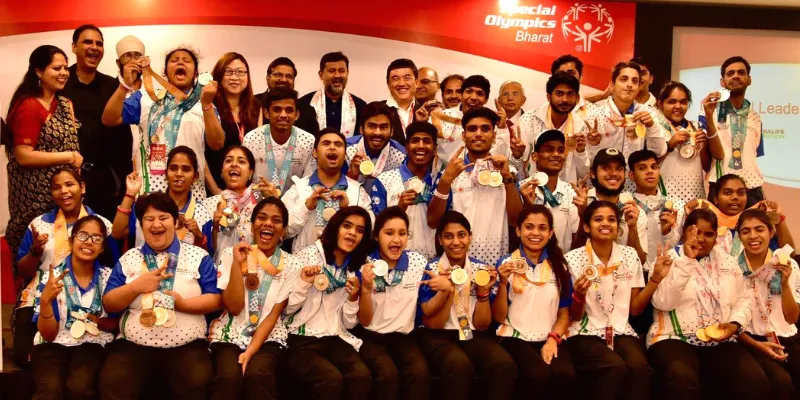
At the recently concluded Special Olympic Games in Abu Dhabi, India bagged 85 gold, 154 silver, and 129 bronze medals. The team, including 289 athletes, 73 coaches and other staff were up against 7,000 athletes from 170 countries.
Back home, in April, 16 teams consisting of 160 visually impaired players from across the country, participated in the fourth edition of the National Blind Football Tournament organised by the Indian Blind Football Federation (IBFF). Then there is the third tri-nation - India, Bangladesh and Nepal - T-20 wheelchair cricket world cup which is underway in Kolkata.
From cricket to table tennis, football, and even golf, India’s specially-abled sportspersons are defeating physical and intellectual limitations to make a difference, and make the country proud.
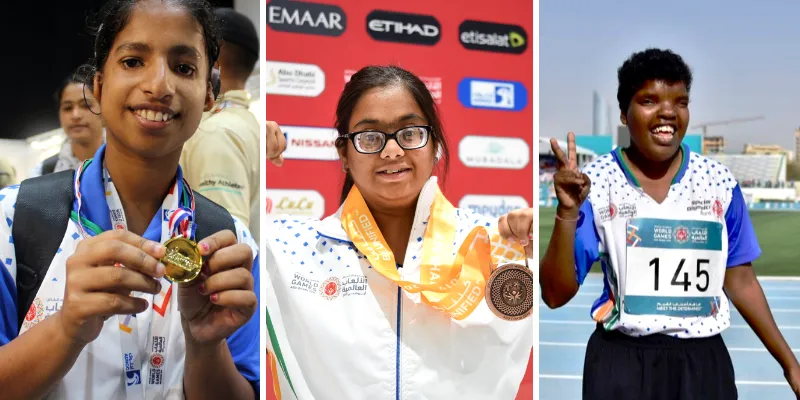
Indian athletes at the Special Olympics World Games, in Abu Dhabi
Air Marshal (Retd) Denzil Keelor, Founder, Trustee and CEO of Special Olympics Bharat (SO Bharat), which is a nodal organisation for special Olympics in India, says:
“Several athletes with disabilities are showing an interest in the field of sports, and they put in a lot of time and effort. It is time we acknowledge this, and support them in their endeavour.”
Racing against all odds
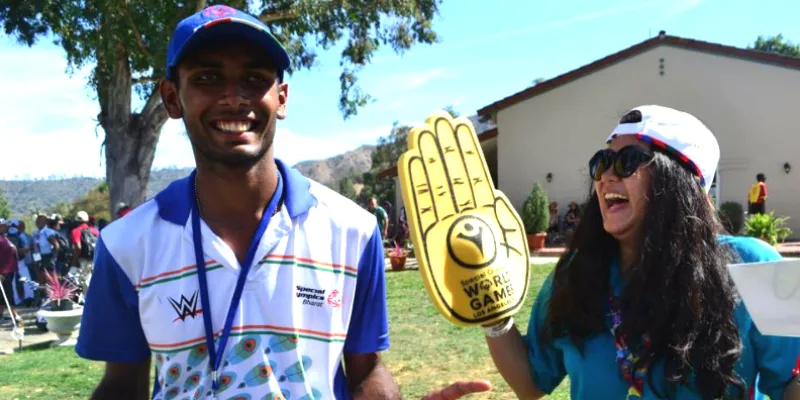
Ankush Saha at the Special Olympics World Games.
Twenty-four-year-old Ankush Saha, who won a silver for India in golf was one of the 150 golfers with intellectual disabilities who played at the 2019 Special Olympics World Summer Games.
“I found it really tough when I started off playing golf. I was unable to judge certain basic aspects like gradient, wind conditions, and directions, due to which I had to put in a lot of effort to learn the technical side of the game.”
Ankush started playing golf when he was 13 years old. He struggled to determine distances and assess speed. With a lower than average intelligence quotient, he found it tough to get past even routine activities like crossing the road, socialising with people, and connecting actions with consequences. However, this did not bog him down. With sheer hard work and determination, he is today an accomplished golf-player with the support of his father, Bipra Saha, and his coach Bamby Randhawa.
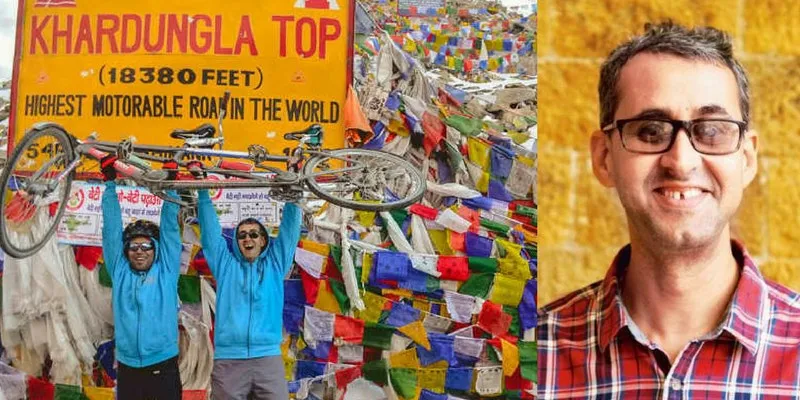
India's first blind solo paraglider Divyanshu Ganatra (41) says his primary struggle has not been against physical constraints, but for breaking societal attitudes.
“There is nothing 'inspiring' about what I have done. Paragliding or mountain climbing or any adventure sport can be done by any individual; what's so special about me doing it? You won't call an able person doing the same (thing as me) as 'inspiration', then why for a disabled.”
Also read: Meet the man who is empowering the specially abled with technology
Robust support system
Stepping onto the football turf at the Bullring Fever Pitch grounds in Yeshwantpur, Bengaluru, all that Gabriel Nongrun could see was darkness.
“My father and siblings used to play football almost every day when I was a child. One day, I asked them to teach me to play the game. At first they told me that I wouldn’t be able to learn since I am not sighted. On requesting them for the second time, they taught me to dribble and kick. Since then, I never looked back. I wanted to prove to the world that even the blind can play football.
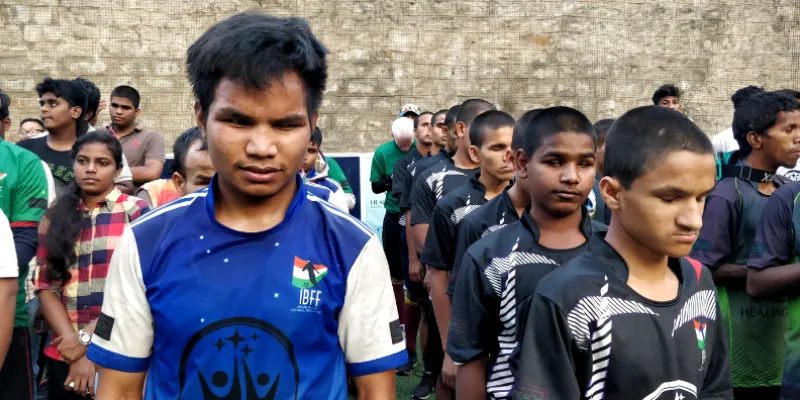
Gabriel Nongrun after scoring five goals at the tournament.
At this year’s National Blind Football Tournament, Gabriel scored five goals for his team, India International.
Victor R Vaz, National Sports Director at SO Bharat, explains that sports has a positive impact on not only an athlete, but also their family. When an athlete is selected, they gain confidence and self-respect. Also, this allays the families’ fear about their child’s future.
Creating an impact
Coaching and formal training are important for all athletes, more so for the specially-abled, primarily because of infrastructure and other special facilities required.
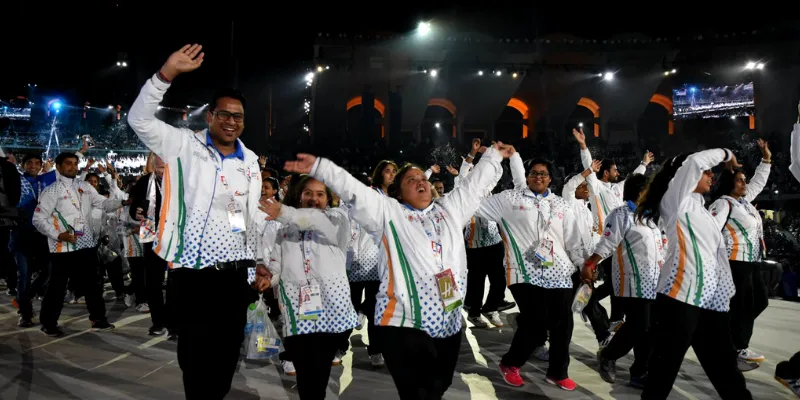
The Indian team at the Special Olympic Games opening ceremony
Infrastructure often proves to be a challenge for the Indian contingent at the Special Olympics World Winter Games.
“For ice skating, we utilise the rink at Ambience Mall in New Delhi. We exploit the opportunity available to us and do everything in our capacity to train our athletes, build their potential, send the team, and give them the opportunity to compete globally,” says Air Marshal Keelor.
The athletes are physically trained at the state level by their respective coaches and schools following which, according to the quota set by the International Special Olympic Committee, they are selected and trained to represent India.
“We help our athletes perform on three main criteria — speed, stamina, and strength. And with adequate skill training, we boost their confidence, which has a positive impact on their performance,” says Victor.
Boost of confidence
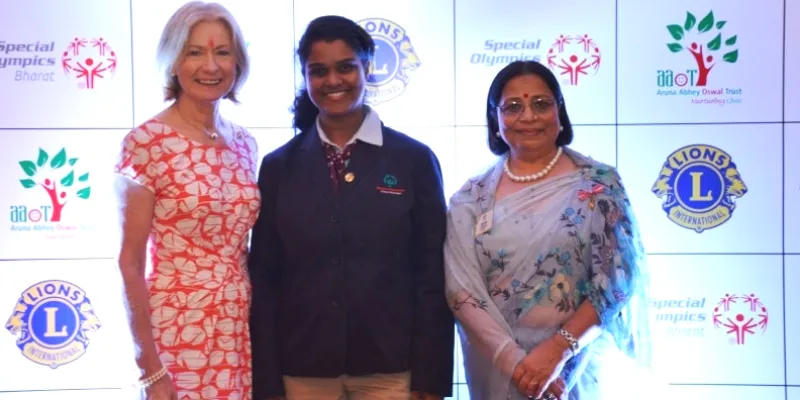
Neha Naik has represented India in the 100 metres relay and shot-put events, and also served as the Special Olympics International Global Messenger (IGM) in 2014. She says:
“Special Olympics made me independent and confident. People accepted me and encouraged me. I felt very important whenever I won medals. I knew I was a good athlete and that I could compete with other athletes. My family was so proud of me. They told friends and relatives about my achievements in Special Olympics. I felt they were including me in their lives.”
Organisations like Touche Golf School, Adventures Beyond Barriers Foundation, Asian Wheelchair Cricket Association (AWCC), Lions Club International, Indian Blind Football Federation and the government-run Special Olympics Bharat are training specially-abled athletes from across the country.
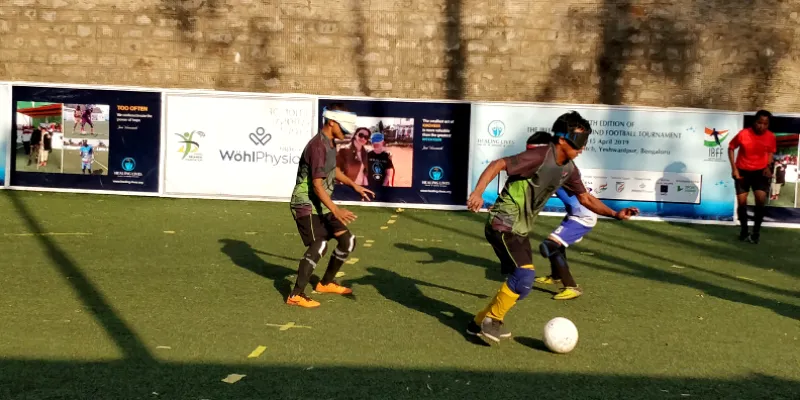
At the National Blind Football Tournament.
Sunil J Mathew, Sporting Director, Indian Blind Football Federation, says,
“The idea of holding these events (National Blind Football Tournament) is to bring together the best of visually impaired football players and show the world that they can shine in the field of sports just like any other sighted person. I must say the amount of talent and potential they possess is unimaginable, and they definitely deserve a lot of recognition.”
Also read: How 24-year-old Ankush Saha overcame his disability and took the big swing to shine in golf
Inclusive India
Disability, Divyanshu says, should be the last word used to describe a blind person. What hurts him is the assumption of the able-bodied that it “must be difficult for one to live with ‘disability’."
"We do not need sympathy, but empathy. The narrative of disability needs to be changed, the language needs to be changed. How disability is portrayed is sad, and people need to know that we don't lead a sad life," he adds.
Also read: How Devika Malik is overcoming disability and wheeling happiness for others






